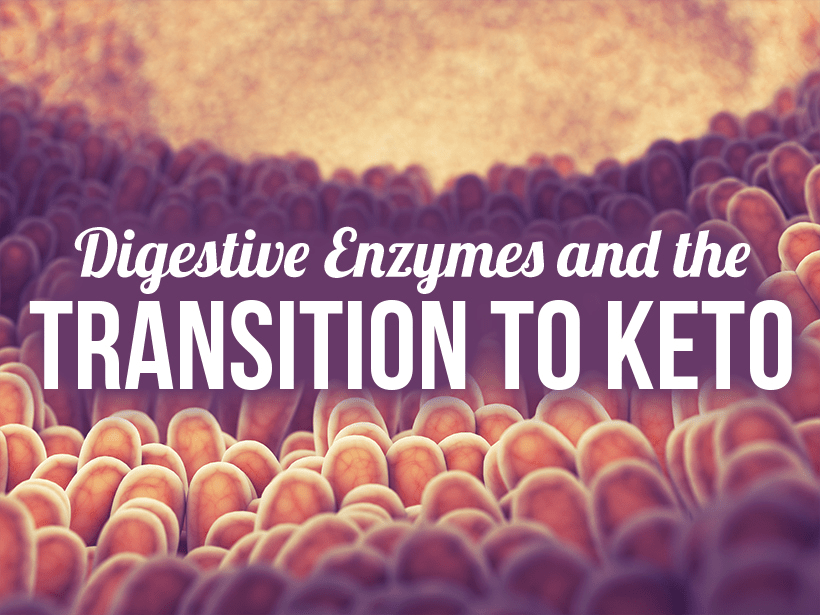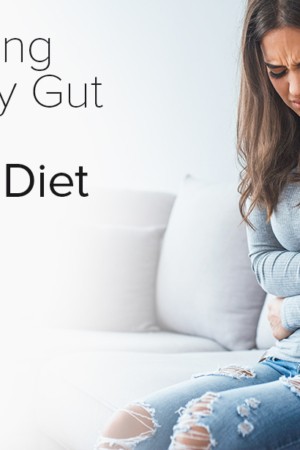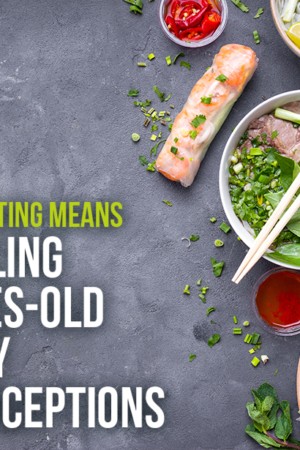If you’re like the average American, you grew up eating a high-glucose diet. You ate bagels, pizza, cereal, spaghetti, and your body became accustomed to a constant influx of various sugars. When you completely change your diet, it means your body needs to change its response to the foods you eat.1
Don’t be surprised if your transition to the ketogenic diet is marked by some minor bloating, diarrhea, cramping, or constipation. These symptoms should go away with time. But what can you do to alleviate these symptoms in the meantime?
It’s important to ensure that your body is digesting your new diet properly. You need to be getting the nutrients you need, and sometimes a multi-vitamin just isn’t enough. After all, all the healthy foods in the world won’t do any good if you can’t properly digest them.
What are digestive enzymes?
Our bodies naturally produce digestive enzymes that help break down food in the mouth, stomach, and small intestine. Digestive enzymes are what make it possible for our bodies to break food down into nutrients that our bodies can absorb. Our pancreas ensures that we can digest fat, protein, and sugars.2
There are three major types of digestive enzymes:
- Lipase: helps break down and process fats
- Protease: helps break down and process proteins
- Amylase: helps break down and process carbohydrates3
Digesting Fat
It might take your body a while to get used to a diet high in fats since fats can be hard to digest for some people.
But why is fat digestion so important? Being able to digest fat is important for the absorption of important vitamins, minerals, and fatty acids. Fat digestion also aids in healthy bile production, which lubricates our stool and makes digestion easier.
What’s interesting about bile is that while it’s made out of fat, it also helps manage the clumping of fat in our digestive tract. When the body doesn’t produce enough bile, fat molecules clump up and make it hard to digest the fat. And without bile, lipases can’t do their job. 4
Tips for Easy Digestion
- Drink warm water with lemon
Before eating anything in the morning, and before brushing your teeth, drink a glass of warm water with juice of half a lemon. This will stimulate your digestive system and increase the secretion of digestive juices, bile, and acids to aid in the breakdown of food.5
- Eat slowly and chew your food more than usual. Chew at least 32 times before swallowing
Digestive enzymes make up the chemical composition of breaking down foods into nutrients, but it all starts with the mechanical breakdown of foods in our mouths. Chewing your food is the first thing you can do to aid digestion by breaking down your food.
- Eat smaller portions
Smaller portions mean the body has to work less to digest the food. If you suffer from bloating after eating, try eating slowly. Put the fork down as you chew. Take smaller bites. And remember – it takes the brain about twenty minutes to realize your stomach is full!
Working closely with a nutritionist can help you understand your personal dietary needs when it comes to digestion. And don’t worry – it’s normal to experience some minor digestive issues at the onset of dietary changes.
If you’re having digestive issues on keto, talk to your doctor about taking a Lipase supplement that is designed to support the healthy digestion of fats. A digestive enzyme supplement can help with inflammation, bloating, constipation, and diarrhea.6
NUTRITIONAL DISCLAIMER
The content on this website should not be taken as medical advice and you should ALWAYS consult with your doctor before starting any diet or exercise program. We provide nutritional data for our recipes as a courtesy to our readers. We use Total Keto Diet app software to calculate the nutrition and we remove fiber and sugar alcohols, like erythritol, from the total carbohydrate count to get to the net carb count, as they do not affect your blood glucose levels. You should independently calculate nutritional information on your own and not rely on our data. The website or content herein is not intended to cure, prevent, diagnose or treat any disease. This website shall not be liable for adverse reactions or any other outcome resulting from the use of recipes or recommendations on the Website or actions you take as a result. Any action you take is strictly at your own risk.
- A Ketogenic Pregnancy: Is It Safe? - June 20, 2018
- Perfect Keto Nut Butter is, Well, Perfect for Keto - May 14, 2018
- The Silicon Valley’s Favorite Diet? Brain-Boosting Keto - May 11, 2018




